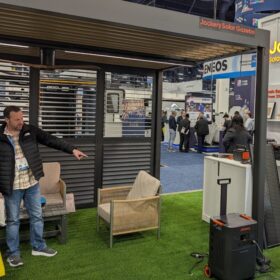Watch: Solar industry leaders discuss unlocking capital and navigating post-tax credit market
Day 1 of pv magazine USA Week 2025 focused on “Unlocking Capital,” addressing the urgent financial and regulatory challenges facing U.S. solar and energy storage. Industry leaders discussed strategies to accelerate solar growth despite tightened tax credit deadlines, increased import restrictions, and reduced federal funding.
Residential geothermal systems positioned to save energy for new construction projects
Dandelion Energy CEO says OBBBA provisions open new pathways to make geothermal more accessible and affordable.
Five trends that will shape renewable energy in 2026
Renewables dominated capacity growth through September 2025 and by balancing speed with resilience, renewables can continue to contribute to a more resilient energy system that extends well beyond 2026, according to Deloitte’s Renewable Energy Industry Outlook.
Over $24 billion in U.S. clean energy investment and 21,000 jobs lost in 2025
The latest data from the E2 Clean Economy Tracker report shows that businesses are canceling, closing or scaling back clean energy plans to the tune of billions per month during the Trump 2.0 administration.
“Procure with haste” as solar power purchase agreement prices rise, says LevelTen Energy
U.S. solar power purchase agreement prices rose 4% quarter-over-quarter in Q3 2025, and prices may continue to increase for “months and years to come,” said a report from PPA marketplace operator LevelTen Energy.
California proposes order of 6 GW by 2032 to get ahead of expiring tax credits
A California Public Utilities Commission Judge called for a “premature” order of additional electric capacity in the state to take advantage of lucrative renewable energy federal tax credits while they still exist.
With federal policy suppressed and energy affordability at center stage, researchers say states have options
Reversing federal policies will have “severe” impacts on electricity affordability, Resources for the Future says, but states can implement carbon pricing to drive down ratepayers’ energy prices and incentivize more renewable energy development.
Clean energy jobs grew three times faster than overall U.S. workforce, but federal obstruction puts growth at risk
Nearly 3.6 million people in the U.S. work in clean energy, with over 500,000 jobs added in the past five years, but growth may be stymied by federal actions, said a report from E2.
Arizona executive order tackles energy affordability as federal actions risk 150,000 jobs
Arizona Governor Katie Hobbs issued an executive order focused on energy affordability and cutting red tape as recent federal actions will “jeopardize 151,122 energy-related jobs and $104 billion in private investment across the Arizona economy.”
New risks for U.S. solar
The One Big Beautiful Bill Act (OBBBA), a related executive order and other policy developments introduce new risks to the solar and energy storage industries in the United States. Changes to tax law affect everything from residential rooftop systems to utility-scale projects. Jesse Pichel and Lev Seleznov of Roth Capital Partners examine the key provisions in recent U.S. policy announcements and their likely impact on the industry.














